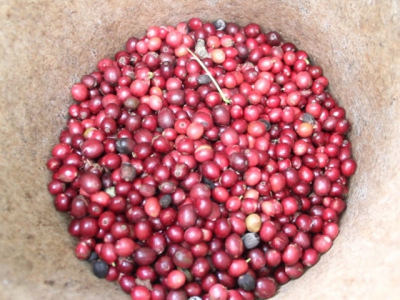Coffee landscape model benefits farmers

Dak Nong Organic Agriculture Cooperative in Dak R'Moan Commune, Gia Nghia City in Dak Nong Province has built a coffee landscape model to improve productivity and quality.
Members of Dak Nong Organic Agriculture Cooperative harvests mid-season ripe coffee beans for better yield and quality. Photo: Quang Yen.
“This year’s coffee has a bumper crop with the production average of over 3.5 tons/ha,” said Pham Van Thach, director of Dak Nong Organic Agriculture Cooperative while introducing his 20-hectare coffee landscape model.
According to Thach, his family's coffee garden is being applied to the model of coffee landscape that meets organic standards. Besides his garden, Dak Nong Organic Agriculture Cooperative has 255 hectares of coffee of its members with an annual output of 650-700 tons.
All coffee areas of the cooperative are built according to three-layer coffee landscape model integrated with ecological gardens.
“The first layer includes fruit trees and pepper plants to cover the sun, dew and wind to regulate the temperature of the garden. The middle layer is for growing coffee and the lowest is the grasslands,” Thach said.
According to him, the grass layer plays a very important role in the coffee landscape model in accordance with the ecological model. If it is properly managed, grass will bring many practical benefits such as creating ground cover to prevent erosion, retaining moisture, adding organic elements to the soil and creating an environment for beneficial microorganisms to grow and therefore helping plants grow better.
Replacing herbicides with grass management helps farmers save water for irrigation by reducing water evaporation and moisture retention, reduce the use of pesticides and support healthy growth of plants. Hence, the quality of coffee has improved and glyphosate residue in the product is eliminated, making it easier for Vietnam to export coffee, especially to the European markets.
The director added that land that is not located in polluted areas of factories and residential areas is not chosen to ensure the implementation of the organic coffee model.
In particular, the cooperative does not use pesticides and plant protection fertilizers in the gardens. Instead, microbial fertilizers or manure from goats, cows, and coffee husks are used to process quality fertilizer products for plants. In addition, the cooperative also cultivates native microorganisms to spray and irrigate the gardens.
“To ensure the model follows international standards, the cooperative has applied an organic process. Accordingly, the cooperative planted buffer zones along the roads as well as gardens adjacent to traditional coffee producing households. This prevents cross-lead contamination between gardens and especially, helps the coffee garden to avoid the wind and the plants therefore could grow more luxuriantly," said Thach.
The director added that the coffee is harvested in the middle of its crop, following the standard organic process. In addition, cooperative members collect at least 90 per cent of ripe coffee to ensure the best quality and flavor.
On harvesting coffee, cooperative members will conduct preliminary processing within the same day. Specifically, coffee will be classified to remove damaged branches or beans. After that, the coffee is put into the machine for processing to retain the natural sugar of its shell.
“The processed coffee is put in a greenhouse to dry on a trellis from 50-70 cm above the ground and stirred constantly. This amount of coffee must be dried continuously for 10 days to ensure quality, "said Thach.
According to Thach, the cooperative is currently building a brand of Kien Vang (ant) coffee. As the cooperative grows coffee in the organic model, many kinds of insects live in the coffee garden. It is found that the coffee plants that have weaver ants nests on them will produce delicious beans with distinctive flavour, which is different from the traditional type.
In addition to coffee, the pepper cultivation of Dak Nong Organic Agriculture Cooperative is also following the organic farming model. Produced according to organic standards, the products always have higher prices than those of traditional ones.
"Both the annual output and the selling price are higher than traditional products, so farmers’ income is always guaranteed," Thach added.
Có thể bạn quan tâm
 Agricultural sector forecast to exceed annual export target for 2021
Agricultural sector forecast to exceed annual export target for 2021 The Ministry of Agriculture and Rural Development (MARD) expects to exceed its annual export target for agricultural, forest and fishery products
 Seeking solutions to improve cooperatives economic efficiency
Seeking solutions to improve cooperatives economic efficiency The key role of the collective in Việt Nam's socialist-orientated market economy has been reinforced through the success of cooperatives up and down the country
 Taiwan will reduce import tax on cashew nuts
Taiwan will reduce import tax on cashew nuts Cashew nuts imported into Taiwan will have a tax reduction in the upcoming future. This is an opportunity for Vietnam - the largest supplier of cashew nuts